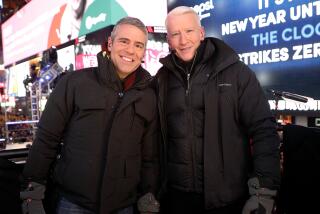Utah TV Station Just Says ‘No’ to Beer, Wine Ads
- Share via
Such familiar advertising phrases as “Give that man a Miller” and “Thanks for your support” are going to be heard a lot less on one TV station.
KSL Television, the second-largest station in Salt Lake City and a CBS affiliate, said on Monday that it would no longer accept beer or wine commercials on its local scheduling. The station, which is owned by the Mormon church, will continue to air beer and wine spots on its CBS network programming, which accounts for the majority of the beer and wine ads it broadcasts.
Executives at the station estimate the decision could cost KSL up to $500,000 in annual advertising revenue--and probably result in about four fewer beer and wine ads each day.
“We’re not on any crusade here,” said William R. Murdoch, executive vice president and general manager of the station that 21 years ago was the second in the nation to ban locally placed tobacco ads. “But maybe we can save a life down the road by reducing the exposure of young people to this advertising.”
Murdoch, who said he is a nondrinker, noted that he made the decision to ban beer and wine ads after consulting with department heads at the station. “We can’t control what the network runs,” he said. “But we can control what we run locally. This is a very conservative marketplace and CBS understands that.”
The station is in the nation’s 41st-largest market, with 3 million potential viewers in 7 states.
How did CBS respond to its affiliate’s decision? “I can tell you they weren’t going to break out the champagne,” said Murdoch. Executives from CBS did not return several phone calls late Monday.
Television industry executives believe that KSL is the first network-affiliated station in the country to specifically slap a ban on beer and wine ads. It will generally affect ads sold during local newscasts and local sports programming. The question is: Will others follow?
“Will this set a trend? Well, each station has to make up its own mind,” said Gene Jeffers, vice president of public affairs for the National Assn. of Broadcasters, the trade association that represents more than 1,000 TV stations nationally. “Advertising income is the sole source of revenues for broadcast stations, so they will have to look very carefully at any restrictions they apply.”
The nation’s brewers, who are facing proposed legislation in Congress to require safety warnings on all beer products and promotions, are not happy with KSL’s move. And they strongly deny that limits on beer advertising decrease alcohol consumption.
“Advertising restrictions do not have a causal relationship to consumption or abuse,” said Stephen Burrows, vice president of consumer awareness and education at Anheuser-Busch Co. The giant beer maker says it hopes the $35 million it has spent over the past 18 months on its “Know when to say when” campaign will help reduce alcohol abuse.
One organization has gone out of its way to praise the move by KSL. “For years, TV stations have said they can’t survive without beer and wine advertising,” said Michael Jacobson, executive director of the Washington Center for Science in the Public Interest. “This is the big test. And I hope it will lead to similar moves in other cities. Stations should ask themselves: ‘If KSL can do it, why can’t we?’ ”
More to Read
The biggest entertainment stories
Get our big stories about Hollywood, film, television, music, arts, culture and more right in your inbox as soon as they publish.
You may occasionally receive promotional content from the Los Angeles Times.









